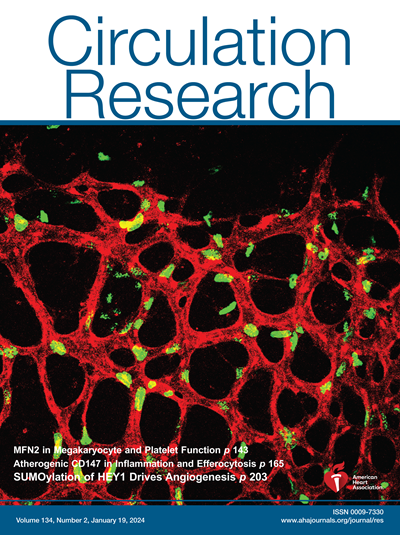Latrophilin-2 Deletion in Cardiomyocyte Disrupts Cell Junction, Leading to D-CMP.
IF 16.5
1区 医学
Q1 CARDIAC & CARDIOVASCULAR SYSTEMS
引用次数: 0
Abstract
BACKGROUND Latrophilin-2 (Lphn2), an adhesive GPCR (G protein-coupled receptor), was found to be a specific marker of cardiac progenitors during the differentiation of pluripotent stem cells into cardiomyocytes or during embryonic heart development in our previous studies. Its role in adult heart physiology, however, remains unclear. METHODS The embryonic lethality resulting from Lphn2 deletion necessitates the establishment of cardiomyocyte-specific, tamoxifen-inducible Lphn2 knockout mice, which was achieved by crossing Lphn2flox/flox mice with mice having MerCreMer (tamoxifen-inducible Cre recombinase) under the α-myosin heavy chain promoter. RESULTS Tamoxifen treatment for several days completely suppressed Lphn2 expression, specifically in the myocardium, and induced the dilated cardiomyopathy (D-CMP) phenotype with serious arrhythmia and sudden death in a short period of time. Transmission electron microscopy showed mitochondrial abnormalities, blurred Z-discs, and dehiscent myofibrils. The D-CMP phenotype, or heart failure, worsened during myocardial infarction. In a mechanistic study of D-CMP, Lphn2 knockout suppressed PGC-1α and mitochondrial dysfunction, leading to the accumulation of reactive oxygen species and the global suppression of junctional molecules, such as N-cadherin (adherens junction), DSC-2 (desmocollin-2; desmosome), and connexin-43 (gap junction), leading to the dehiscence of cardiac myofibers and serious arrhythmia. In an experimental therapeutic trial, activators of p38-MAPK, which is a downstream signaling molecule of Lphn2, remarkably rescued the D-CMP phenotype of Lphn2 knockout in the heart by restoring PGC-1α and mitochondrial function and recovering global junctional proteins. CONCLUSIONS Lphn2 is a critical regulator of heart integrity by controlling mitochondrial functions and cell-to-cell junctions in cardiomyocytes. Its deficiency leads to D-CMP, which can be rescued by activators of the p38-MAPK pathway.心肌细胞中 Latrophilin-2 的缺失会破坏细胞连接,导致 D-CMP 的产生。
背景Latrophilin-2(Lphn2)是一种粘附性GPCR(G蛋白偶联受体),在我们以前的研究中发现,它是多能干细胞分化为心肌细胞或胚胎心脏发育过程中心脏祖细胞的特异性标记。方法Lphn2缺失导致的胚胎致死性要求建立心肌细胞特异性的、他莫昔芬诱导的Lphn2基因敲除小鼠,这是通过将Lphn2flox/flox小鼠与α-肌球蛋白重链启动子下的MerCreMer(他莫昔芬诱导的Cre重组酶)小鼠杂交实现的。结果连续几天的他莫昔芬治疗完全抑制了 Lphn2 的表达,特别是在心肌中,并诱导出扩张型心肌病(D-CMP)表型,在短时间内出现严重的心律失常和猝死。透射电子显微镜显示线粒体异常、Z-盘模糊和肌纤维开裂。D-CMP 表型或心力衰竭在心肌梗死期间恶化。在一项关于 D-CMP 的机理研究中,Lphn2 基因敲除抑制了 PGC-1α 和线粒体功能障碍,导致活性氧积累和连接分子(如 N-cadherin(粘连连接)、DSC-2(去绒毛粘连素-2;去绒毛体)和 connexin-43 (间隙连接))的全面抑制,从而导致心肌纤维开裂和严重的心律失常。在一项实验性治疗试验中,Lphn2 的下游信号分子 p38-MAPK 的激活剂通过恢复 PGC-1α 和线粒体功能以及恢复全局连接蛋白,显著地挽救了 Lphn2 基因敲除者心脏的 D-CMP 表型。它的缺乏会导致 D-CMP,而 p38-MAPK 通路的激活剂可以挽救 D-CMP。
本文章由计算机程序翻译,如有差异,请以英文原文为准。
求助全文
约1分钟内获得全文
求助全文
来源期刊

Circulation research
医学-外周血管病
CiteScore
29.60
自引率
2.00%
发文量
535
审稿时长
3-6 weeks
期刊介绍:
Circulation Research is a peer-reviewed journal that serves as a forum for the highest quality research in basic cardiovascular biology. The journal publishes studies that utilize state-of-the-art approaches to investigate mechanisms of human disease, as well as translational and clinical research that provide fundamental insights into the basis of disease and the mechanism of therapies.
Circulation Research has a broad audience that includes clinical and academic cardiologists, basic cardiovascular scientists, physiologists, cellular and molecular biologists, and cardiovascular pharmacologists. The journal aims to advance the understanding of cardiovascular biology and disease by disseminating cutting-edge research to these diverse communities.
In terms of indexing, Circulation Research is included in several prominent scientific databases, including BIOSIS, CAB Abstracts, Chemical Abstracts, Current Contents, EMBASE, and MEDLINE. This ensures that the journal's articles are easily discoverable and accessible to researchers in the field.
Overall, Circulation Research is a reputable publication that attracts high-quality research and provides a platform for the dissemination of important findings in basic cardiovascular biology and its translational and clinical applications.
 求助内容:
求助内容: 应助结果提醒方式:
应助结果提醒方式:


